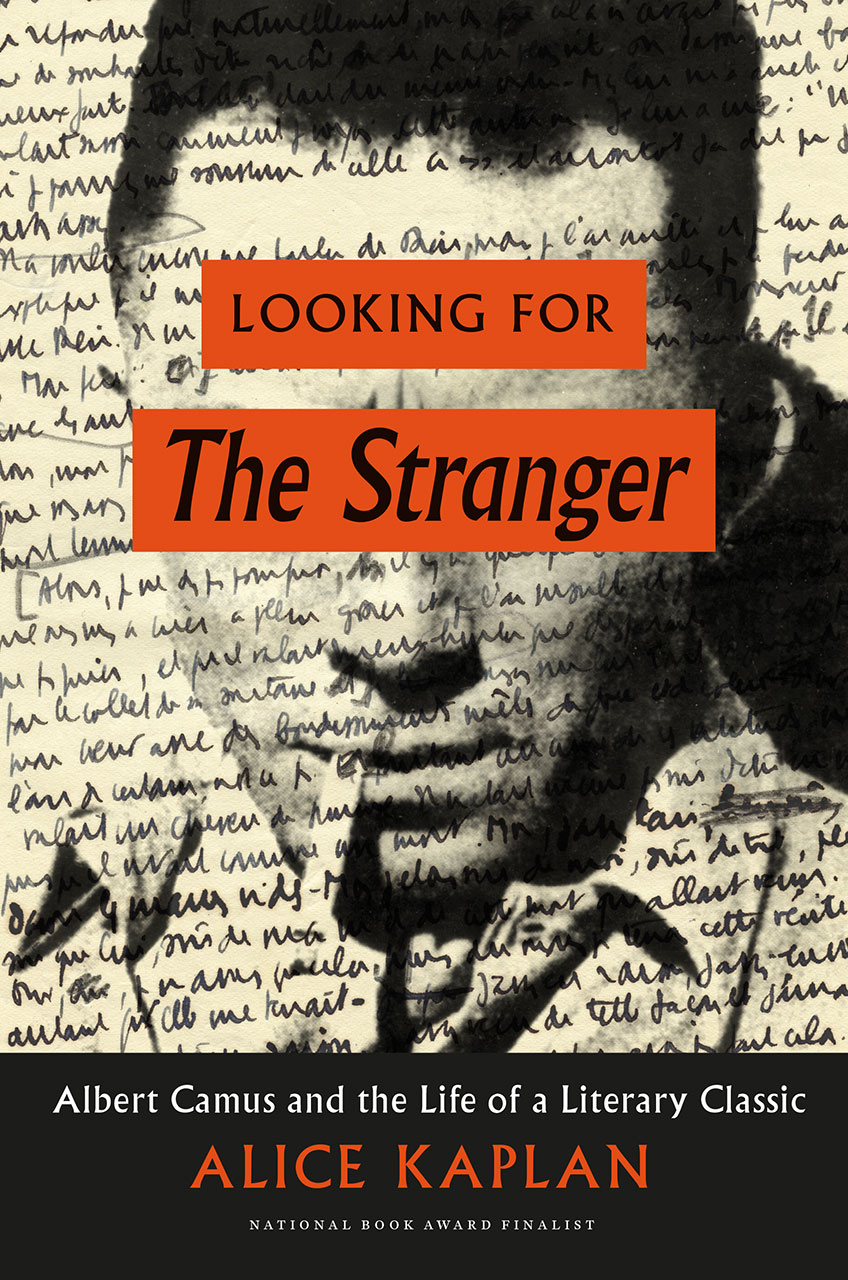By Alice Kaplan (Guest Contributor)
How did Camus come up with the name for Meursault, the hero of The Stranger ? His is one of the most famous names in modern literature, and one of the most mysterious.
In the late 1930s, Camus drafted a first novel he called A Happy Death. He revised it many times but was never satisfied, and finally put it away in a drawer. The main character of that novel was a man named Patrice Mersault—Meursault minus the “u.”
It’s worth taking a look at the two names—Mersault and Meursault—and thinking about how Camus might have gotten from one to the other. When you pronounce “Mersault” without the “u,” it sounds ethnically Spanish, like “Merso.” “Merso” is a name that could have belonged to heavily Spanish ethnic Europeans who lived in Oran, or to a kin of Camus’s mother Catherine Sintès, whose people were from Minorca. But Meursault is different. For any French reader, that name can only signify the delicious and expensive white Burgundy wine.
 I was really shocked when I looked at the only surviving manuscript of The Stranger and discovered that Camus writes his character’s name without a “u” throughout. Where did that “u” come from ? Some Camus experts claim he thought of the name change at a dinner party where he was served an especially good bottle of the Burgundy wine. Then there’s the story of the contest. Every November, a literary prize of 3,000 bottles of Meursault wine was awarded to a book celebrating the glory of the land. An ad for the prize appeared in the French press in November, 1941, as Camus was putting finishing touches on his novel. Although Meursault isn’t a very funny guy, Camus himself had a great sense of humor, and I can imagine him joking to his friends that naming his main character “Meursault” was a sure way to win the prize.
I was really shocked when I looked at the only surviving manuscript of The Stranger and discovered that Camus writes his character’s name without a “u” throughout. Where did that “u” come from ? Some Camus experts claim he thought of the name change at a dinner party where he was served an especially good bottle of the Burgundy wine. Then there’s the story of the contest. Every November, a literary prize of 3,000 bottles of Meursault wine was awarded to a book celebrating the glory of the land. An ad for the prize appeared in the French press in November, 1941, as Camus was putting finishing touches on his novel. Although Meursault isn’t a very funny guy, Camus himself had a great sense of humor, and I can imagine him joking to his friends that naming his main character “Meursault” was a sure way to win the prize.
Certainly Camus had other reasons to make the change. First there is something more expected about the way Meur-sault sounds to a French ear than Mer-sault. Then again, the extra “u” makes the first syllable of his character’s name signify death meur (death), which serves the purposes of a story in which Meursault commits murder and waits to die at the guillotine.
 I have another theory about the name change, but no way to prove it. In the early spring of 1942, Camus was in Oran, Algeria, deathly sick with tuberculosis. So he asked his publishers to proof read the pages of the novel for him, in Paris. Is it possible that they took matters into their own hands, or that they checked with the author in a communication that is lost to us, and changed Mersault to Meursault on publisher’s page proofs ? Some of the greatest moments in world literature are the result of a last minute, last second cross out. We’ll never know if this is one of them.
I have another theory about the name change, but no way to prove it. In the early spring of 1942, Camus was in Oran, Algeria, deathly sick with tuberculosis. So he asked his publishers to proof read the pages of the novel for him, in Paris. Is it possible that they took matters into their own hands, or that they checked with the author in a communication that is lost to us, and changed Mersault to Meursault on publisher’s page proofs ? Some of the greatest moments in world literature are the result of a last minute, last second cross out. We’ll never know if this is one of them.
 Alice Kaplan is the author of French Lessons: A Memoir, The Collaborator, The Interpreter, Dreaming in French: The Paris Years of Jacqueline Bouvier Kennedy, Susan Sontag, and Angela Davis, and Looking for The Stranger. She is the translator of OK, Joe, The Difficulty of Being a Dog, A Box of Photographs, and Palace of Books. Her books have been twice finalists for the National Book Critics Circle Awards, once for the National Book Award, and she is a winner of the Los Angeles Times Book Prize. She holds the John M. Musser chair in French literature at Yale. She lives in Guilford, Connecticut.
Alice Kaplan is the author of French Lessons: A Memoir, The Collaborator, The Interpreter, Dreaming in French: The Paris Years of Jacqueline Bouvier Kennedy, Susan Sontag, and Angela Davis, and Looking for The Stranger. She is the translator of OK, Joe, The Difficulty of Being a Dog, A Box of Photographs, and Palace of Books. Her books have been twice finalists for the National Book Critics Circle Awards, once for the National Book Award, and she is a winner of the Los Angeles Times Book Prize. She holds the John M. Musser chair in French literature at Yale. She lives in Guilford, Connecticut.
